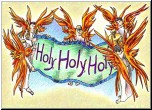|
So much for the pagans; what would Christians make of an angry
god? Some would bow down to worship; Jonathan Edwards, a New England
divine, wrote a famous sermon entitled, 'Sinners in the Hands of an
Angry God.' To Bible-readers, 'anger' and 'God' are not two concepts
which self-evidently do not belong together. While the thought of
lowly Jesus, meek and mild, accords with some artistic sentiment,
there is another side:
"Instead of looking at books and pictures about the New
Testament I looked at the New Testament. There I found an account,
not in the least of a person with his hair parted in the middle or
his hands clasped in appeal, but of an extraordinary being with lips
of thunder and acts of lurid decision, flinging down tables, casting
out devils, passing with the wild secrecy of the wind from mountain
isolation to a sort of dreadful demagogy; a being who often acted
like an angry god — and always like a god."
(G. K. Chesterton,
Orthodoxy, Kindle location 2233).
There is no pleasing everybody; what shocks the pagans awes some
Christians. The fact that the New Testament was not written, in the
end, to meet pagan standards, tilts the scales
against his novel interpretative demand, that the New Testatment must have
been edited to meet pagan theological scruples.
What would Bart Ehrman, who is given to carpet-chewing rages against the
Christian God who allows little African children to die of starvation,
make of the impassive god of the pagan philosophers, who cannot suffer
and whose response to human suffering is 'I don't care'? Those
impressionable young people under the impression Bart Ehrman is an
original thinker should realize that this business about Mark's
'angry' Jesus is atheist boiler-plate:
"In Mark Jesus is essentially human; He yields to
emotions; He wonders and asks questions; He is fallible. In Matthew
and Luke He passes into a godlike calm and becomes omniscient. Mark,
describing the healing of the man with the withered arm, makes Jesus
fly into a rage against the Pharisees who objected to miracles on
the Sabbath; Matthew and Luke discreetly pass over His anger."
(H. L. Mencken, A Treatise on the Gods, Kindle location 2317).
This is already packing an immense interpretive weight onto a
miniscule amount of data, but Bart Ehrman's novel spin on the old
theme asks even more of the reader. If one reference to Jesus'
'anger' was purportedly edited out, then why weren't the others? To
be consistent, we also must drop on the cutting room floor the other scripture verses
which ascribe anger to the Lord, which our Epicurean scribal corrector
strangely left untouched. One such is John 11:33, "Therefore, when
Jesus saw her weeping, and the Jews who came with her weeping, He groaned
[ev + brimaomai] in the spirit and was troubled." Richmond Lattimore has for this
verse, "he raged at his own spirit." In this latter case, we
can scarcely accuse Jesus of resentment against Lazarus for dissing Him,
because Lazarus was dead! Dead people must be excused for their lack of
respect, attention, and indeed even animation; there is such a thing as
a circumstance beyond one's control. More likely He was angry at the condition
brought in by fallen human nature, whereby friends must part unwilling
and fellowship be broken. His enemy is death: "The last enemy that
is annulled is death." (1 Corinthians 15:26), not the dead man, Lazarus,
over whom His enemy gained the upper hand. One does not look down at a
fallen comrade with anger, but at his slayer.
But in truth, any believer in this passionless god must commence his editorial
deletions, not with an obscure textual variant in Mark found so infrequently it
has little or no statistical chance of being authentic, but with the passion
narratives. Christians believe that God the Son suffered a tortured death upon
the cross, becoming man in order to suffer such a death. This 'theos apathes' cannot and would not do.
Reconciling the 'theos apathes' of the philosophers with
the Suffering Servant is a lost cause, requiring not a single
deletion but a total conceptual rewrite. Are the far from
passionless gods of popular pagan piety a better 'fit' for the Lord?
One thing the gods cannot do, says Ovid, is weep: "She
spoke, and like a tear (for gods can never weep) a crystal drop fell
on her bosom warm." (Ovid,
Fasti). But
Jesus wept: "Jesus wept." (John 11:35). The Lord hid not from shame
and spitting: "I gave my back to the smiters, and my cheeks to them that plucked
off the hair: I hid not my face from shame and spitting."
(Isaiah 50:6).
How the pagan gods reacted to human mistreatment is displayed by
Dionysus in the Homeric
Hymn: they not only get mad, they get even, turning their human
tormentors into various gruesome and unwelcome things. Much as
Bart Ehrman wants to squeeze Jesus into the mold of a pagan god, He
does not naturally fit.

Problem of Evil
Bart Ehrman wrote a book entitled 'God's Problem,' which purports to address
the 'problem of evil.' This book follows a rather peculiar methodology.
Announcing that the Bible offers differing answers to the question, 'Why
is there suffering?,' Dr. Ehrman proceeds to isolate and address each successive
'answer.' He then evaluates each atomized answer for its comprehensiveness
in explaining all suffering. There is a problem right away. Suppose it
were true the Bible adduces a variety of causes for the phenomenon 'suffering.'
Compare this situation with an airplane crash, for which the authorities
advanced 'icing' and 'pilot error' as causes.
They say that nowadays there is rarely a plane crash for which there is
one cause, or for that matter a nuclear power plant which could melt down
for one reason, because these systems are so well designed that the operators
can work around any one problem. But if there are two, three, or four failures,
the system becomes unstable, its behavior unpredictable, and the operators
make errors because they do not understand what is happening. The appropriate
response by the flying public to the airplane crash caused by 'icing' and
'pilot error' is not to isolate the two causes advanced and evaluate them
for their suitability in explaining all plane crashes. To say, '"Icing"
cannot explain all plane crashes because some planes fall out of the sky
in mid-summer,' is certainly true, but what consequences follow therefrom?
This author's method of isolating the 'different explanations' is atomistic
in the extreme. The following statement unpacks to, not one, but two 'different'
explanations for 'suffering:'
"Thus saith the LORD; For three transgressions of Israel, and for four, I will not turn away the punishment thereof; because they sold the righteous for silver, and the poor for a pair of shoes..."
(Amos 2:6).
There are two, not one 'explanations' for 'suffering' here: a.) God punishes
Israel for, among other things, selling the poor for a pair of shoes, and
b.) the poor suffer because the wealthy have sold them for a pair of shoes.
So one statement, that certain behavior invokes certain consequences, becomes
two rival theories of suffering. What is even stranger is that, in the discussion
of the 'first explanation,' we will weep for the wicked who are punished,
while turning our attention to the second, we will grind our teeth that
the wicked have not been punished immediately. Whose side are we on?
In reality, not only does the Bible not offer multiple answers to the question,
'Why is there suffering?,' the Bible never asks the question. That's Gautama
Buddha's question, and there is already a levelling present in so formulating
the issue. The Bible authors never for one moment thought there should
be an equality of outcomes between the wicked and the righteous. If the
wicked suffer, then they darn well ought to, not so the righteous. No doubt,
we are all desperately wicked; that is a Bible truth as well; but we are not
so held for purposes of God's providential governance. God is
a God of justice, not of the avoidance of suffering. Gautama Buddha
discovered, or imagined, that the cessation of conscious existence
would mean the end of suffering; one can always hope. The Bible does
not wonder why humanity suffers, but why the righteous should do so,
when it is the wicked who deserve this outcome. If difficulties
arise, it is within that framework. When Israel bound itself to the Law
Covenant of Deuteronomy 28, they were binding themselves, not only to God,
but to each other. Anyone who has ever gone surety on a loan for another
person can already sense a potential problem. A righteous remnant cannot
save the nation from the operation of the curses of Deuteronomy 28. Why
did Israel fall to Assyria and Judah to Babylon? Because God lives up to
His promises.
But then when we look at a private individual, Job, who is not even under
the law, our perspective is already different. Part of the reason the Bible
gives 'different answers' is because these are different questions, not
the same, never asked, one. The fact that this is the only question Bart
Ehrman knows how to, or cares to, ask, is his problem, not God's problem. There is a tendency, even in this life, for
God to lift up the righteous and cast down the wicked, but such is not
seen in every case, for reasons beyond our perception. Not until Job, his
body consumed by worms, stands by his Redeemer, will he be vindicated.
But given the gulf between God's grandeur and man's smallness, demanding
justice is out of place, as he comes to realize. To continually interject
the same question: a question the Bible never asks once, let alone multiple
times,— is to grab the text by the neck and throttle it, not to let the
text speak.
Given the inexplicable methodology here employed, the reader is further
perplexed to learn the author was driven "kicking and screaming"
out of the Christian fold, purportedly by just these inept and inconsequential
arguments:
|

























